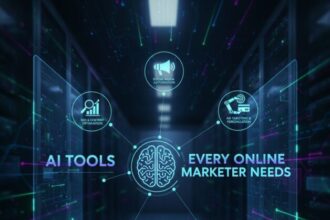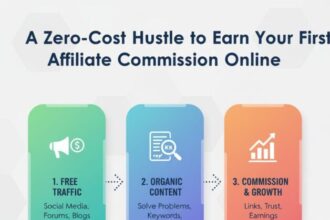Top Career Oriented Certifications to Boost Your Job Prospects
The only sound in the room was the humming of my laptop fan working overtime. It was late, I was on my third cup of lukewarm coffee, and I was in what I can only describe as a job-hunt-induced trance.
I was just clicking. Mindlessly clicking from one job posting to the next.
Every tab I opened in my browser just made the knot in my stomach a little bit tighter. All these companies seemed to want a person who was part-data-scientist, part-marketing-guru, and part-graphic-designer. I read one that wanted “a deep understanding of our brand’s semiotics.” What does that even mean? I just wanted a job where I didn’t feel like a dinosaur.
My resume suddenly felt… ancient. Like a document from a lost civilization. It had all the right stuff—my degree, my previous jobs—but it didn’t speak the language that these companies were using. I was fluent in a dying tongue.
It’s a uniquely terrible feeling, being qualified on paper but feeling totally unqualified for the world as it exists right now.
I was about to give up for the night, probably to go stare at the contents of my fridge for twenty minutes. But I clicked on one last ad. And way down at the bottom, past all the impossible demands, was a little phrase: “Applicants with relevant professional certifications will be given strong consideration.”
That was it. That was the little thread I needed to pull on. I opened a new tab, pushed the other 30 tabs of despair aside, and typed a phrase I barely understood: top career-oriented certifications to boost your job prospects. It was a shot in the dark.
Just Trying to Make Sense of the Noise
My initial “research” was a chaotic mess. It felt like I’d just walked into a conversation that had already been going on for hours.
Everyone was talking in code. I’d land on a website and just see a wall of letters. One page was talking about getting a “PMP,” and another was talking about “AWS,” and something else called “CompTIA.” I think I saw “Six Sigma” somewhere, which sounded more like a military operation than a career move. It was just an endless stream of this stuff.
It was intimidating. Honestly, it felt like a club that didn’t want me as a member. Like all the articles and guides were written for people who were already in the know.
The first few things I clicked on were these big, flashy professional development courses hosted by universities. They had fancy websites and pictures of smiling people in business suits. They also had price tags that looked like a down payment on a house. That was a hard pass.
I wasn’t looking for another four-year degree. I was just trying to learn what everyone else seemed to already know.
It Was Like Trying to Read a Different Language
What really threw me off, more than anything else, was the jargon. Everything was written in this weird, inflated corporate language.
I’m talking about phrases that just float around in business meetings but don’t actually mean anything concrete. Stuff about “demonstrating core competencies” and “aligning with strategic goals.” My brain just starts to glaze over when I read things like that. I just wanted someone to talk to me like a real person. I just wanted a straight answer.
It’s a strange place to be in. Feeling like you’re smart and capable, but you don’t even have the vocabulary to ask the right questions. It was frustrating, and I almost packed it in at least five times.
The Pizza Story That Unlocked It All for Me
Just as I was about to give up and declare myself officially unemployable, I stumbled deep into a forum. In a discussion thread, one user completely ignored all the corporate-speak and told a little story that was like a key turning in a lock in my brain.
He explained it like this: Your degree is your proof that you went to cooking school. You learned all the fundamentals. You know about food safety, you know how to prep, you know how to run a kitchen. It’s the essential foundation. You need it.
But a specific in-demand industry certification is different. That’s like having a special, official certificate that says you are a master at one thing: barbecue. You’ve proven you can smoke a brisket for 14 hours until it’s perfect. You know the difference between a dry rub and a mop sauce. You know your hickory from your mesquite.
He said if you’re opening a barbecue joint, you don’t just need a good cook. You need a pitmaster. You need the person who can prove they know brisket.
And just like that, I got it. It finally made sense. This wasn’t about replacing my education or my years of experience. This was about gaining a very specific, very provable skill. It was about learning how to smoke the brisket. And all of a sudden, I was hungry to learn.
Stuff I Thought I Knew (That Was Completely Wrong)
Once I had that simple idea in my head, I started to look back at my own assumptions. And I realized that I had been thinking about this all wrong. The common “wisdom” I had in my head wasn’t helping; it was holding me back.
If you’re anything like me, you might have some of these same ideas floating around in your head. And they might be the very things keeping you stuck.
That Huge Misconception About How Much It Costs
The first, and biggest, story I was telling myself was that I couldn’t afford it. It was my go-to excuse. I saw those university course prices, and I just assumed everything cost that much. “Well, that’s not for me,” I thought. “That’s for people whose companies pay for everything.”
That was such a convenient and lazy excuse. The truth? I was just wrong. Once I started digging into the certifications offered by the actual tech companies that make the software—the Googles, the Microsofts, the Amazons, the HubSpots of the world—the picture changed completely. Many of them offer free learning materials and courses. You just have to pay a relatively small fee to take the formal exam. We’re talking about less than the cost of a new video game in some cases. The real price wasn’t measured in dollars; it was measured in my evenings and weekends. The commitment was my time, not my bank account. And that was a much harder excuse to justify.
The Silly Idea That They’re Just Empty Resume Filler
I used to be so cynical about this. My first impression was that these were just digital stickers you put on your LinkedIn to look busy. A way to pad out a thin resume.
And, I guess if you just cheated your way through the exam and did a memory dump the second it was over, that’s all it would be.
But that misses the entire point of the exercise. The certificate itself is the least important part of the whole deal. The real change happens in your head while you’re studying. The process of forcing yourself to truly learn a new subject, inside and out, is where the value is. That’s what gives you the confidence to actually talk about the subject with some authority. It’s that newfound knowledge that actually makes them valuable credentials for your resume. It’s not the line item itself; it’s the competence that the line item represents.
That Old Chestnut About Experience Being the Only Thing That Matters
“You just need to work hard and get good experience,” is the advice I got from a lot of well-meaning people. “All that other stuff is just fluff.”
And I get it. I really do. Nothing is more valuable than years of actual, in-the-trenches experience doing a job. We need to just accept that as a fact.
But that advice is starting to show its age, because it skips over a critical first step. How do you get the job to get the experience in the first place? So many companies now use automated software to sift through the hundreds, sometimes thousands, of applications they get. These systems aren’t people. They don’t have intuition. They are given a list of keywords to search for. So, if a company needs someone who knows a particular piece of software, the first pass of their filtering system is probably just going to be a search for the name of that software’s official certification. If you have it, you make the cut. If you don’t, you’re likely in the digital trash bin. You might be the most experienced candidate in the pile, but you’re effectively invisible.
The Mental Shift That Finally Made It All Click
I’d been wrestling with this stuff for weeks. I was going back and forth, feeling hopeful one minute and totally overwhelmed the next.
The moment it all really cemented for me, though, was when I stopped thinking about the certification as the goal itself. That little mental trick changed the entire feel of the project.
It was a simple change in perspective, but it made all the difference.
You’re Not Collecting Badges, You’re Building a Toolbox
Here’s the shift: a certification is not a trophy. It’s a tool.
A trophy is something you get after the fact. It sits on a shelf and looks nice. It’s about celebrating something you already did. It’s passive.
A tool is something you use to get a job done. A hammer, a wrench, a power drill. You fill a toolbox with these things so you are prepared to build or fix whatever comes your way. It’s active. It’s about what you are now capable of doing.
The goal isn’t to possess a certificate. The goal is to become the person who is genuinely competent at the skill the certificate represents. The paper is just a label on the outside of your toolbox that clearly tells people what you can do for them. Once I started thinking “I am learning this so I can build something with it,” my motivation went through the roof. It wasn’t a chore anymore; it was an investment in my own capabilities.
I Finally Had a Name for the Feeling: The Skills Gap
That shift also helped me finally put a name to the anxiety I’d been feeling. That sense of dread that came from looking at all those job ads.
It was the feeling of being on the wrong side of the digital skills gap.
That’s the term for the space between the skills most of us have, and the skills that are actually in high demand in the economy right now. That gap is real, and it’s getting wider all the time. I was standing on one side of it, looking at all the opportunities on the other, and it felt like there was no way to get across. I’m thinking about writing a whole other post about this, maybe something about how to do a quick self-inventory of your own skills to see where you stand.
A good certification is simply a bridge. It’s a pre-built, engineered, efficient structure designed to get you from the “I don’t know how to do that” side of the gap to the “Oh yeah, I can handle that” side. This wasn’t about trying to impress some recruiter anymore. This was about building my own bridge to my own future.
My Personal, Cobbled-Together Plan for Getting Started
So after all of that agonizing, I finally managed to create a little step-by-step plan for myself. It’s nothing fancy, and it’s certainly not the kind of thing you’d find in a career counselor’s office. It’s just what worked for me, a regular person who was completely lost.
It’s less of a formal strategy and more of a way to cut through the noise.
Step 1: Actually Look at the Jobs You Want
Before you read another list of “top 10 certs,” do this first. Open up about 15 job postings for jobs you would actually be excited to have. Don’t just pick things you think you’re qualified for; pick your dream jobs. Now, start making a simple list. Every time you see a specific certification or a specific technology platform mentioned in the requirements, add it to your list and put a little checkmark next to it. After you’re done, you’ll have a list not of what some blogger thinks is important, but of what the actual companies you admire are looking for. The one or two items with the most checkmarks? That’s your starting line.
Step 2: Look for Programs That Make You Do the Work
As you vet your options, always prioritize hands-on certification programs. You want to find programs that force you to actually do the thing you’re trying to learn. Look for descriptions that include things like projects, labs, and real-world simulations. There’s a world of difference between memorizing the definition of a tool and actually using that tool to complete a task. The experience of doing it is what makes it stick in your head and, more importantly, gives you something interesting to talk about when someone interviews you. You get to tell a story about something you built or solved.
Step 3: Check to Make Sure It’s a Real Thing
Be a little paranoid here. The internet has a lot of official-looking nonsense for sale. Before you commit, you have to find out if the certification is actually recognized by people in the industry. The best and most obvious choices come from the big tech companies themselves or major industry organizations like the Project Management Institute (PMI). If you’re not sure about one, use LinkedIn as your verification tool. Search for the name of the certification and see how many people have it listed on their profiles, and what kind of jobs they have. If lots of people in your target role have it, you’re on the right track. If you can’t find anyone, run away.
Step 4: Make Sure It Makes Sense for Your Story
Finally, every decision should pass this simple test: does it make sense in the story of my career? You want a certification to feel like a logical next step, not a bizarre plot twist. It should connect your existing skills to the skills you want to have. For example, if you’re a talented writer, learning about SEO is a natural extension. It takes your writing talent and makes it more valuable in the digital world. Being able to explain that logic clearly is half the battle. You get to define your own specialized training benefits and sell that story. It also makes things like networking feel a whole lot less awkward, because you have a clear, concise story about who you are and where you’re going.
So, Where Does That Leave Me?
I’m still on the journey. I haven’t suddenly transformed into a super-confident industry hotshot with a perfect career. A lot of days, I still feel like I’m just figuring things out as I go.
But the feeling of being stuck? That’s gone. It’s been replaced by a sense of motion. Of progress.
I picked one area to focus on. I signed up for a foundational certification. I spent my weeknights watching instructional videos instead of Netflix.
And a couple of months later, I passed the test.
No, my world didn’t magically change overnight. But my mindset did. And the next time I got an interview, and the conversation turned toward that very specific topic, I didn’t have that old familiar spike of panic.
I just took a breath. And started talking about the new tools I had in my toolbox.
That’s all it is, really. Just finding one new tool to add. What’s the first tool you’re going to pick up?































